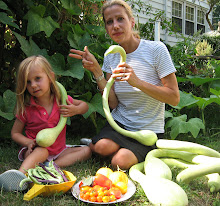While not a comprehensive list of all things male, female or otherwise growing in my garden, a definitive few – the masculine and feminine, the tough and the tender, the sturdy and the dainty – make the cut as follows:
Female Plants

Tomatoes are most definitely female. With their hanging orbs perfectly cupped by a gentle hand and warmed by the sun, the fruits await a tender bite to release sweet, dribbling juices. When sliced, a gentle but skilled tongue can probe the gorgeous and glistening inner wells of the fruit for every last drop of sweet and salty goodness.
Summer squash - and the winter squash for that matter. The plants have a gently rambling form with bursting blooms and curlicue tendrils and are extremely productive. Plus the pollinating bees practically run each other over as they compete to enter the soft folds of the open, welcoming blossoms. There’s a lot of sex going on in the garden. And it’s constant in the squash bed.

Delicate fronds of Chervil and her subtle, mysterious taste.
Basil. Perhaps it is the way a good Genovese basil’s scent wafts up as you walk past, like a woman’s perfume. Perhaps it’s the lacy, ruffled edges of certain varieties that make it female. You tell me.
Rhubarb is female. My plant is a division from my grandmother. It has long, bright crimson stalks hidden beneath a canopy of large leaves. The leaves are poisonous but the stalks never fail to please and surprise. The raw taste will bite your tongue off, but its sweet and tangy flavor can be coaxed out by slow, steady, gentle cooking. And like a woman, the plant gets better and better with age.

Contrary to the knee-jerk “meat & potatoes” man’s meal image, potato plants are female. They have delicate, dangling lavender flowers that look lamentingly downward for the eyes to see, but like women, all their deepest secrets are buried beneath the fertile earth.
Male Plants
My climbing, vining, twining pole beans are male. This year, they have aggressively enveloped the three obelisks anchored in the bed and are venturing beyond, threatening to take over each other’s territory. If that’s not male, I don’t know what is. Also, this year, the bean plants are all boast and bravado: they’re puffing their chests, but not producing. By July of last year, I’d already harvested bales of beans. This year, it was slim pickings. These vines are all talk, no action. Definitely male. However, once the beans are prepared by an expert hand and transformed into a glistening tangle of oiled and herbaceous crisp-tender delight, they become female. The climbing bean exception would be Christmas limas. Once two thumbs gently ease open the pod, you reveal their hot fuschia striations of color. Those plants are definitely female from the start.
Tromboletta zucchini. Those hanging zucchinis are male, for obvious reasons. Plus, unchecked, the vigorous vines could overtake an entire backyard.

Tuscan kale is male, with its dark leaves, pebbled texture and plant heft and height.
Eggplants are male. I really gave this some thought because I just couldn’t quite decide. The leaves have a soft underside and the flowers are quite interesting. But they have a tough skin and take just sooo, sooo long to mature, if they do at all. Are they worth the wait? Some say eggplant is an acquired taste. But with the proper care and attention, eggplant can be trained and transformed in the kitchen into a variety of palatable dishes. That transformation is by a female hand, of course.
That’s not everything growing in my garden by any means. I’ve barely considered the cucumbers. Perhaps one night this week, after everyone’s in bed, I’ll sit on the patio with a glass of wine, survey my surroundings as the season winds down, and figure out the sex of my radicchio.
But for now, I think I need a cigarette.

No comments:
Post a Comment